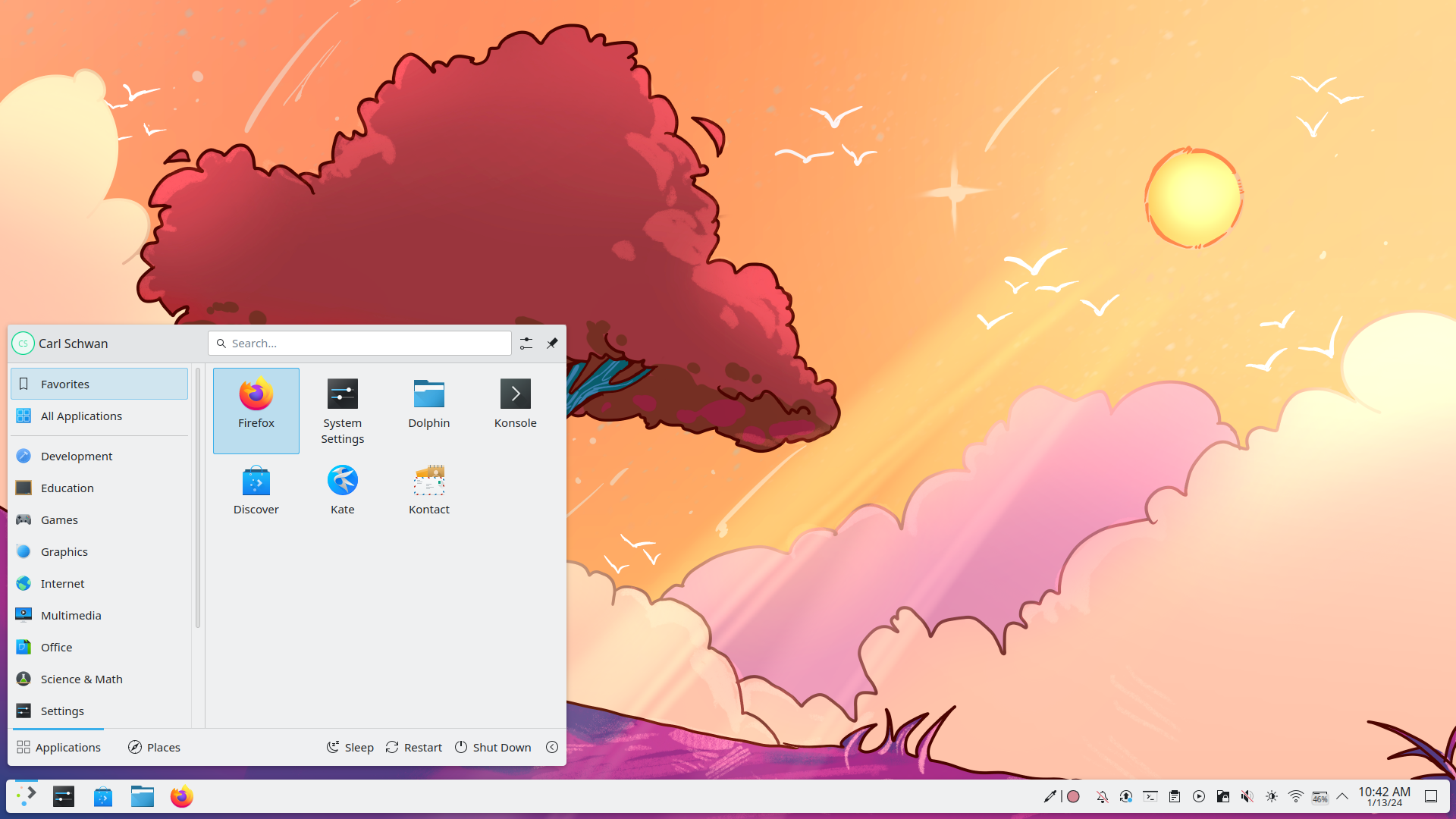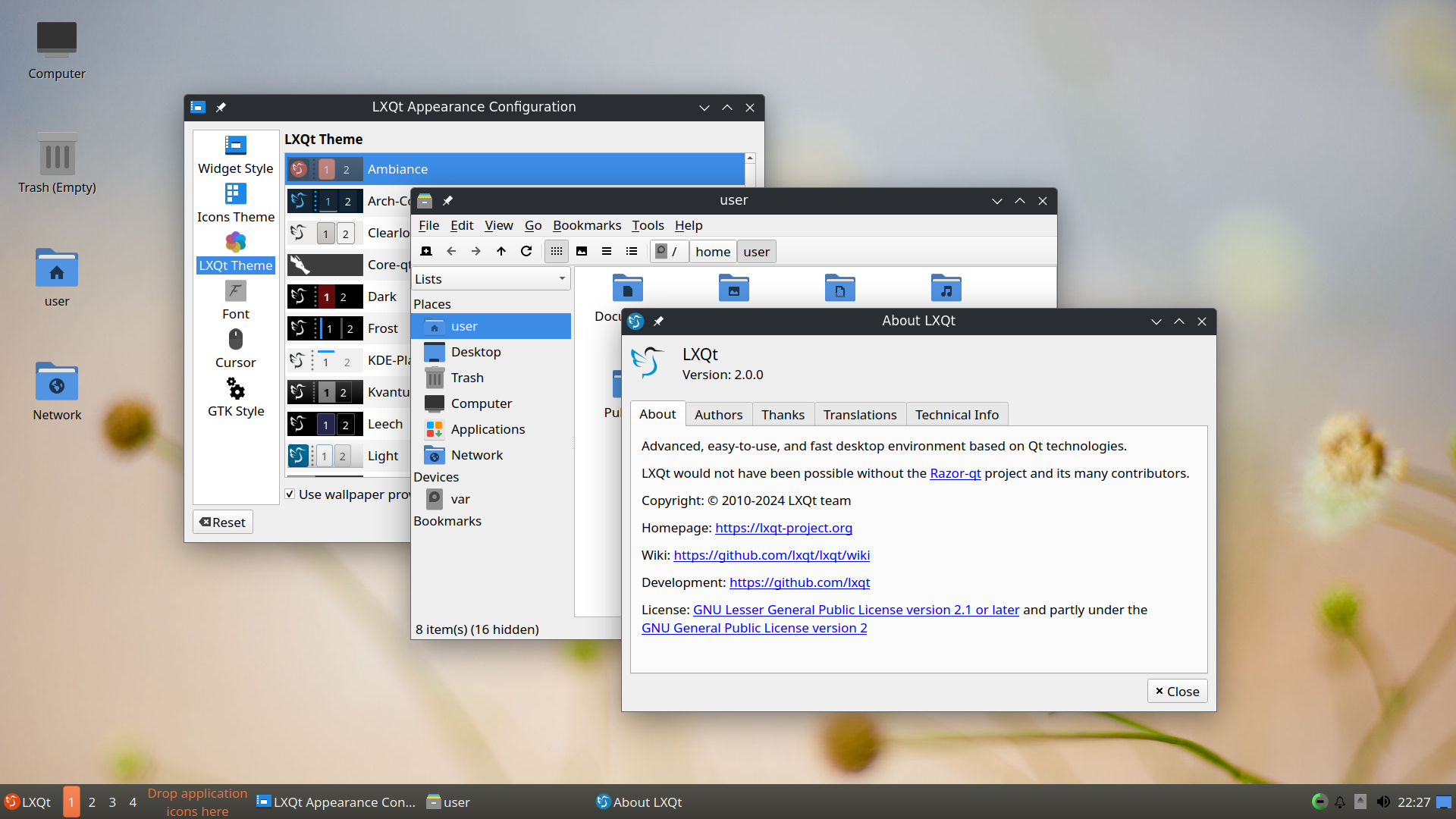Why are distro communities turning linux more and more into Windows and Mac OS clones?
This is why I use Arch.
Damn. I really liked manjaro
It’s like finding out your favorite YTber touches kids… feels bad man.
Great…Right now, when I was thinking about finally installing Manjaro (I saw its for noobs, pretty well designed, i’m tired of “power users” distros). What else then? I used EOS, it was buggy sometimes errors etc., I use cachyOS and all the time errors and problems, but i just don’t care anymore, Ubuntu is corporate’s shit, maybe Mint or Fedora? Actually, I kinda liked flatpak recently, maybe I could live without AUR he? But on the other hand I need this rolling release cycle, thats why I hoped Manjaro is such “stable arch”, I’m nvidia user…
What is your preferred desktop environment from below?



Based on your choice I can recommend you a one.
Also do you prefer stability or getting the latest updates?
KDE only, I would prefer stability (as I’m tired of things breaking up), but I need latest updates (thats why i liked flatpak, cuz it partially replaces need of AUR).
Let me warn you first, your GPU might cause some issues with the distro.
Based on all the info you told me about the distro you want, I would recommend Opensuse Tumbleweed.
After installing you would just need to install Nvidia drivers and the codecs and you will be ready to go.
If you plan to use flatpacks for your media playing software and browser then you won’t need codecs as it’s included in the flatpacks.
Just don’t forget to configure auto update and when you start installing at the final screen before clicking install make sure that ssh is disabled and selinux is enabled for extra security.
Extra notes:
-
The default browser is firefox, but it can be replaced with any other browser.
-
If you want a working office suite and you don’t have high requirements, you can choose between Libre Office, Free office[Prop] or WPS office [Prop].
I hope you enjoy your time on linux.
I have to admit its interesting pick, I will try that out first in VM, thanks for suggestion :)
-
Could also check out openSUSE if you don’t mind the lack of an AUR
Yeah not really “don’t mind”, but hopefully I won’t need it, thanks
EndeavorOS is what you want, fits the same niche but without being fucking Manjaro. :-)
Well I tried, it was better than cachyOS now, but still it was not so for noobs, i had to fix many problems using it
since a third of manjaro is coming form austria, i apologize ⅓ times for its existence
Because telemetry as implemented and spying are in fact very very different, and conflating the two is why “noone cares about privacy”. When your giant conspiracy wall is “Manjaro knows a user in north America clicked on the start menu more often then typing into a quick search box” and you refer to that as spying, you hurt the actual cause you claim to support. Badly.
The same is true for Microsoft, ive been asking for years for any concrete proof of spying a normal human would care about and what I usually get is the Microsoft terms of use, a legal document that reflects reality less than the average legal document, and the average legal document is basically covering your eyes and hoping nobody sues you.
And because I think the correct way to dick swing in this community is as follows…I also use arch 🍆 (well endeavour, but I think I still get dick swinging credits)
Counterpoint; it’s really none of their business to know how often I click on something, and neither do I want them to have the ability to figure that out either because there is no reason to assume that those are the only data points they can get their grubby hands on.
If there is no reasonable way for me to differentiate between spying and telemetry, I rather wish they couldn’t do either.
Friends don’t let friends use Manjaro
Use EndeavourOS or another Arch derivative instead.
Or just plain arch. Installing it with archinstall isn’t that hard
And it’s a one-time thing, then you just
pacman - Syuinto the sunset. Consider setting up btrfs with snapshots, which is a life saver when an update goes bad. I use snapper on openSUSE Tumbleweed and it has saved me from bad NVIDIA updates a couple of times, which is the main reason I switched from Arch a few years ago.
I’m usually a defender of opt-out telemetry in Linux, what with it usually being trivial to untick in the installer, the telemetry not being invasive, the telemetry being private and not being able to identify people, it being used to actually benefit Linux rather than make money, and because opt-in telemetry is useless (as repeatedly stated by multiple Linux projects that I trust, such as KDE and Gnome)…
That said, holy shit this telemetry collects stuff it really should not be collecting. This is not what Linux telemetry should be. Doubly so from a distro with a troubled past in terms of management and security. This is a red flag.
Manjaro manages to do just about everything wrong for one reason or another. They’re trying to be the Canonical of the Arch ecosystem and they’re not even close to competent enough to pull it off.
I’m sure they’ll find some way to DDOS something with their own telemetry sooner or later.
Yeah, I don’t understand why people use it, it’s just more buggy Arch. If you really don’t want to deal with the installer, use an installer like Endeavor OS.
Or if you think Arch is unstable, use a different distro, because Manjaro is worse. I like openSUSE Tumbleweed (also rolling, but much more reliable), and there are tons of other great distros (Fedora/Garuda, Debian/Mint, etc). Use pretty much anything but Manjaro…
For gaming rigs, check out Garuda, imo a pretty nice Arch distro without telemetry and easy installation.
Oh, you can vote whether it should be opt-in or opt-out.
Oh, voting requires “Trust level 1”.Anyway, I may stop donating to Manjaro due to this. Now I just go with Arch anyway.
archinstalleven makes it quick to setup a VM.I had a forum account from long ago that I barely use and even I was able to vote … so if you had an account there, give it a try and vote!
The only thing archinstall script misses for me is option for flatpak setup from the get go
Oh, voting requires “Trust level 1”.
I’ve found that some people use Linux just to be apart of the “cool tech kids” on the internet. They don’t understand how to use a CLI, what kernel level access is, what a kernel is, or even how Linux actually works as opposed to Windows/Mac.
I think Manjaro was made for them. It’s like the MLM version of a Linux distro.
Are you trying to gatekeep Linux to only power users that use a CLI, are way above the average in computer literacy, and happen to know the nuances between Linux and other operating systems?
This is the kind of thinking that will prevent adoption to the masses. Linux doesn’t have to be stupid hard to use. There are specific distros like vanilla Arch for advanced users to tinker with and options like Manjaro and Ubuntu that are ideally functional out of the box for those that just want something to work.
What Manjaro is doing here is dumb AF, and should rightfully be heavily criticized, but you statement feels like your saying you should have to be a computer expert to use any Linux distro, and that’s dumb.
These fuckers want to prevent adoption of Linux to the masses. They hate the very idea of someone new asking questions.
This is the kind of thinking that will prevent adoption to the masses.
Why do people always assume that is even something desirable? All that will get us is more requests for support with fewer people actually helping.
Linux doesn’t have to be stupid hard to use.
And the assumption that GUI=easy and CLI=hard should have really died in the 90s when it started.
As someone who read at least 2/3 of the DOS 6 manual when it came out, and have used a variety of Linux flavors as well, a command prompt is the least helpful interface devised. What do you type there? How do you let the computer know when you’re done typing? If the answers seem obvious to you, think about why, and what on the screen would point you that way if you hadn’t had training. People are very visual, in general, and a simple interface such as a mouse that directs focus and has a minimal amount of interaction options is far easier to get started with, especially if the GUI has culturally intuitive icons (save needs updating).
I don’t think the power of the command line, or text interfaces in general, can be overstated, but even the most helpful text interfaces, such as those found in some IDEs, require prior knowledge to be useful. This isn’t going to work for the majority of people.
If you think GUI is intuitive you have never worked in support and despaired at people trying their best to get “simple” concepts like “left-click” vs. “right-click” wrong.
Oh, I have. Now imagine giving those people a command line.
At least there’s only a single way to tell the computer “ok, execute this command”. And you see the command written in plain text before you.
And, no, no useful interface is intuitive because computers just have too many functions. There’s no intuitive appliance in the world with more than a temperature knob and a timer knob. Knowledge is always required, be that cultural or by RTFM.
It is literally easier to explain to them how to do something on the command line than in a GUI, both in documentation and over the phone. That doesn’t mean they will ever discover how to do something in either interface on their own but I don’t really expect that from the people who make paper notes of the step-by-step process in GUI workflows anyway.
This is a “cool tech kid” opinion. Linux is for EVERYONE. Let’s not gatekeep it. Having GUI tools and stuff that is so easy to use that tech-illiterate people can use Linux is a great thing.
I’ve found that some people use Linux just to be apart of the “cool tech kids” on the internet. They don’t understand how to use a CLI…
I hope that’s true. If Linux has come this far to make PC life possible for the cool kids, I say welcome to each and every one of them.
I mean, when I started using Linux I also tried to avoid the CLI, and I was successful at that with Mint for quite a while. Actually, updating Mint in GUI is faster. I didn’t find a way to enable parallel downloads for apt like for pacman, but the GUI does just that.
Very much possible nowdays. I haven’t even switched from Windows, I got a first computer, didn’t know the difference between Linux Mint and Windows, but I found Mint easier to use. Windows confused me with separate settings and control panel, and then some guide asking me to do woodoo in scary looking registry editor…
Oh boy looks like my weekend will be spend learning and trying to install Arch without a graphical installer. To be fair Manjaro on my laptop was my first try at Arch. I never thought how much I will come to like AUR.
EndevaourOS is already on my gaming rig so plain Arch for my laptop seems like a good challenge. Farewell Manjaro, I learned a lot
After you figure out how to properly partition your disk, you learn how the entire setup is actually quite simple Basically, Mount partitions, pacstrap to install the base system, generate fstab, chroot in, create a unprivileged user and add it to sudo, setup grub, configure internet, exit chroot and unmount, reboot into the newly installed system, configure X11/Wayland to your liking
Installing Arch is a lot easier than fixing a bad Manjaro update. I get that it’s intimidating, but it’s really quite easy if you can follow instructions, but budget a couple hours your first time because you’ll probably second-guess everything. The second time should be more like 30 min.
'Till you figure out that, on Arch, if you missed/broke anything, you can boot into the Arch USB, mount your root into /mnt, and arch-chroot in to fix whatever is broken
Yup, a live image works in a pinch. IMO, just use BTRFS on root and install something like snapper to handle snapshots and you shouldn’t need the live USB (unless you bork your bootloader somehow).
Be me, and bork BTRFS itself while trying to compile OpenMW from source
How did you manage that??
There are things in this world you are not meant to fiddle with And apparently, glibc is one of 'em
I highly recommend BTRFS as your root filesystem, and then configure snapshots. This way if an update goes sideways (pretty rare), you can roll back and wait for fixes.
I haven’t used Arch for a few years, but my openSUSE Tumbleweed install came with it by default, and it has saved me a few times in the 7 or so years I’ve used it. Maybe the new instructions include that, idk, but you’ll be glad you have it.
the
archinstallscript is officially supported and very straightforward. like, almost Calamares-but-in-TUI straightforward.Going to second other comments. Even without archinstall. It feels like it will be harder than it is. Umm, just save yourself a bit of time and configure the network and install a console editor (nano/vim whatever) while in the chroot (if going full manual). It was a minor pain to work around that for me.
There are pages discussing how to do everything (helps to have a laptop with browser, or a phone to look them up). At the end, you generally know exactly what you installed (OK no-one watches all the dependencies), and I’ve found any borks that happen easy to fix because I know what I installed.
It’s not that hard, just read the install guides and instructions. My first Arch install was like 8y ago and I expected it to be difficult - it wasn’t.
Meanwhile my first Gentoo system… I was expecting to be not so bad… Holy f I was wrong
The compile times are abusive on older hardware for sure
I got a Xeon E3-1220 V3, thought it’d handle well A whole ass day and it still wasn’t done
Opt out telemetry is annoying. There’s no guarantee it doesn’t send before I’ve had a chance to disable.
If I were using Manjaro right now, at the first opportunity, I would be switching to something else. Too much enshitification happening everywhere, and people need to start voting with their “wallets” to stop these greedy fucks.
Finally time to update manjarno.snorlax.sh again -_-
deleted by creator
I was just getting used to using Manjaro for my dev machines due to rolling release. Gotta find new flavor now.
OpenSuse Tumbleweed. Reliable and up to date.
Haven’t touched suse ecosystem since they were suse. Now I just feel comfortable with Debian or arch.
Well Debian doesn’t have a rolling distro, does it?
It was something that underpinned your choice and now it’s not. I’m not sure why you said gotta find when you already knew the answer.
It kind of does, if you count testing / sid.
Got into rolling release very recently with Manjaro (realized Debian doesn’t have rolling release). Just started getting used to arch packaging. I wouldn’t consider myself knowledgeable in rolling release options
Consider Endeavour.
Yup saw it recommended in one of the comments as well, I’ll look it up.
deleted by creator











